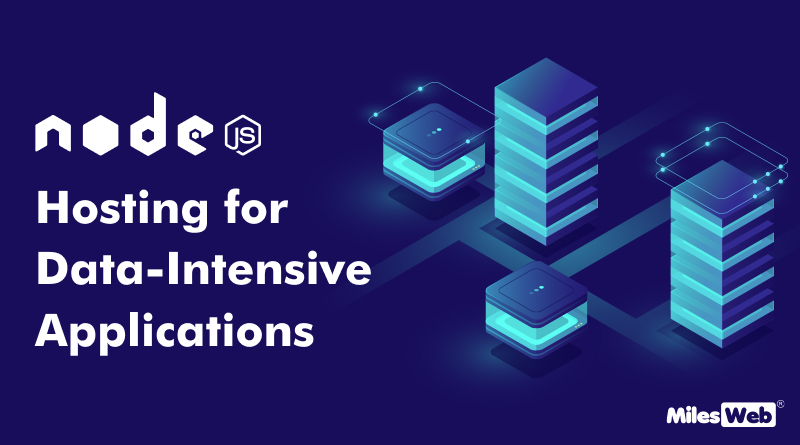In the digital landscape, where data stands as supreme, Node.js emerges as a powerful tool for businesses and developers handling data-intensive applications.
Whether it’s e-commerce transactions or social media interactions, the ability to process and serve data with speed is essential Node.js hosting, with its event-driven model, efficiently manages large volumes of data on the websites.
Hence, when it comes to selecting a web hosting platform for data-centric projects, cpanel webhosting stands out as the go-to choice, empowering businesses to make data-driven decisions seamless.
In this guide, we’ll explore how Node.js hosting can tackle the challenges of data-intensive applications and help you harness the power of big data.
Let’s start with the basics.
What Are Data-Intensive Applications?
Data-intensive applications, as the name suggests, are software applications that process and manage vast amounts of data. These applications can include real-time analytics, social media platforms, e-commerce marketplaces, and more.
Why Are Data-Intensive Applications Used?
Data-intensive applications are necessary for all platforms that involve complex data processing, storage, and retrieval tasks. Thus, to handle these tasks, data-intensive applications are used.
Why Choose Node.js Hosting For Data-Intensive Applications?
Node.js hosting is gaining popularity due to its event-driven architecture, which ensures efficient handling of large data volumes in real time. For data-intensive applications, Node.js is an ideal choice. Here are the reasons why developers should choose Node.js hosting to host their data-intensive applications:
Non-Blocking I/O
You might be aware that Node.js is renowned for its event-driven, non-blocking I/O architecture. This means it can efficiently handle multiple data requests simultaneously. In data-intensive applications, where data is constantly flowing in and out, this capability is invaluable.
Scalability
Data-intensive applications often need to scale up or down rapidly based on traffic. Higher traffic signals a higher demand for supplying and handling the data. Hence, the lightweight nature of Node.js allows it to scale across multiple server instances, ensuring that the application can handle the demands of data.
Real-Time Capabilities
Many data-intensive applications require real-time updates and interactions with users, for example, live chat applications. Node.js’s real-time capabilities, combined with its extensive libraries, make it an ideal choice for applications that demand instant data updates.
Rich Ecosystem
Node.js boasts a vast ecosystem of open-source packages and modules. This ecosystem accelerates development and allows developers to access tools for data processing, storage, and analysis.
JavaScript Usability
Node.js simplifies the process of development with its use of JavaScript on both the server and client sides of an application. As a result, developers find it easier to build and maintain data-intensive applications.
Use Cases for Node.js Hosting In Handling Big Data
The name Node.js strips high for data-intensive applications. Here are some examples to mention the practical use cases where Node.js hosting excels in handling big data:
Real-Time Analytics:
Node.js’s real-time capabilities are well-suited for applications that require instant data analysis and visualization. From tracking website traffic to monitoring IoT devices, Node.js can provide real-time insights.
Social Media Platforms:
Social media platforms like Twitter use Node.js to handle massive amounts of data, including tweets, user interactions, and trending topics. Node.js’s speed and scalability make it ideal for these data-intensive platforms.
E-commerce Marketplaces:
Online marketplaces deal with a constant influx of data, from product listings to customer transactions. Node.js hosting can efficiently manage the data flow, ensuring smooth e-commerce operations.
Data Streaming:
Applications that involve continuous data streaming, such as live video streaming or stock market updates, benefit from Node.js’s ability to handle real-time data feeds.
Big Data Analysis:
Node.js can be integrated with big data processing frameworks like Apache Hadoop and Apache Spark. This allows developers to build applications that analyze and extract insights from vast datasets.
Challenges and Considerations
While Node.js hosting offers significant advantages for data-intensive applications, it’s essential to be aware of potential challenges:
Memory Consumption
Node.js applications can consume significant memory, especially when dealing with large datasets. Proper memory management and optimization are crucial to prevent performance issues. The web host you choose should be able to accommodate the storage requirements in your Node.js hosting plans.
Long-Running Tasks
Node.js’s single-threaded nature makes it less suitable for CPU-intensive tasks that block the event loop. Developers must carefully design applications to offload such tasks.
Database Choices
The choice of database is critical for data-intensive applications. Node.js supports various databases, including MySQL and relational databases, but selecting the right one depends on the application’s specific needs.
Wrap Up
To host data-intensive applications, Node.js hosting emerges as a powerful web hosting solution for businesses and developers. Its non-blocking I/O, real-time capabilities, scalability, and rich ecosystem make it an excellent choice for handling big data.
Whether you’re building real-time analytics platforms, social media giants, e-commerce marketplaces, or data streaming applications, Node.js hosting equips you with the tools to harness the potential of data in today’s digital age.
You must study and research all the Node.js hosting providers before selecting your hosting partner. However, to save your effort and time, you can directly visit the website of MilesWeb to find all your Node.js hosting requirements.
They promise 24/7/365 expert team support with a 99.95% uptime guarantee. With scalable plans and terminal end access, it handles data-intensive applications and websites smoothly.
So embrace Node.js hosting and unlock the full potential of your data-intensive applications.




Comments are closed.